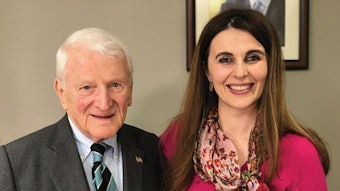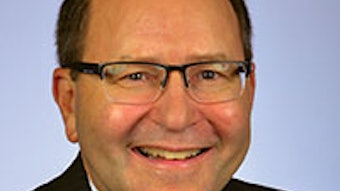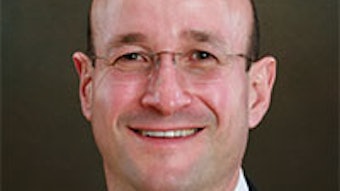Practice profile: Raise your hand
Kathleen L. Yaremchuk, MD, MSA, is the Chair of the Henry Ford Hospital’s Department of Otolaryngology-Head and Neck Surgery, a personal accomplishment for her. She talked with Bulletin staff regarding gender disparity in opportunities for leadership roles across the country and academic settings.
Kathleen L. Yaremchuk, MD, MSA, is the Chair of the Henry Ford Hospital’s Department of Otolaryngology-Head and Neck Surgery, a personal accomplishment for her. She talked with Bulletin staff regarding gender disparity in opportunities for leadership roles across the country and academic settings.
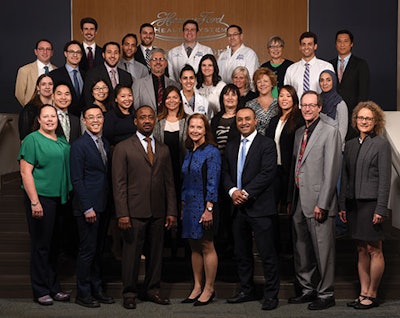
With 106 academic departments across the country, there are only five female chairs.
“I am the longest-serving female chair, but in the 10 years since I have been appointed, there has not been a change in the number of female chairs. Just as there were only five female chairs 10 years ago, there are still only five female chairs today, or 4.7 percent,” Dr. Yaremchuk said.
She serves as Chair of the Gender Disparity Committee for the Society of University Otolaryngologists-Head and Neck Surgeons. In 2017, there were 17 open chair positions. In a typical year, there are only four to five positions that become open.
“Still, with that vast opportunity to recognize the qualifications of females with impressive CVs, only one female was offered a chair position,” she said. “It is unclear why that is the case, but it is incumbent upon us to find the answer. It may be due to a ‘glass ceiling.’”
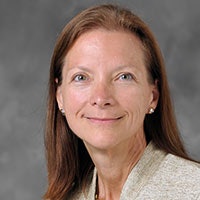 Kathleen L. Yaremchuk, MD, MSA
Kathleen L. Yaremchuk, MD, MSALast year, the Association of American Medical Colleges announced that, for the first time ever, the enrollment of women in medical schools exceeded that of men. Currently, 34 percent of otolaryngology residents are female, and there has been a decrease in the number of women applying for residencies from 41.7 percent in 2013 to 27 percent in 2017.
Awareness and Acknowledgment
Dr. Yaremchuk believes that if there is an awareness and acknowledgment of this disparity, a future strategy for action and change can occur. But it will take both men and women to participate in the process.
“The gender disparity in leadership is multifactorial and there needs to be different strategies to address the issues,” she said. “It can’t just be women trying to find a solution. Men must be involved in it as well. Having men as allies in this effort is essential for success in providing opportunity and advancement.
“We know the best and brightest are coming into the specialty of otolaryngology-head and neck surgery. So, if you want to recruit the best and the brightest, who happen to be women, then you need to have women in your department. It is often called the ‘halo effect.’ We all bring unconscious bias to our decision-making, but as long as we are aware of it, we can work through it.”
Many orchestras hold blind auditions, where the person auditioning for a place in the orchestra does so behind a screen so the judges can only judge them by their performance and not personal characteristics, such as being male or female, or on their age, which may reflect their experience. A recent article in The Guardian1 describes the successes orchestras have had.
“It seems impractical to imagine evaluating someone but remaining ignorant of their sex. But the orchestras show us: It can be done,” the article reports.
“This is a perfect example of awareness and acknowledgment to effect change,” Dr. Yarumchuk said. “The awareness of gender bias in the selection of the symphony first chair, second chair, etc., especially as they looked at their lack of diversity in gender representation, led to an acknowledgment and action. There are good examples that we can implement in our own practice, our own settings, and in our specialty to eliminate unconscious bias.”
Raise Your Hand
Dr. Yaremchuk emphasized the importance to “raise your hand” to opportunities in leadership. It should be up to the search committees and/or hiring entities to decide if you are the right candidate. This sentiment is referenced in an article published in the Wall Street Journal titled, “Men Pitch in to Boost Women at Work.” 2
“Often, contrary to their male counterparts, females can prejudge their qualifications and eliminate themselves from the pool of candidates without applying for the position and going through the interview process,” she said.
When she applied for the Chair position at Henry Ford 10 years ago, Dr. Yaremchuk took the opportunity to “raise her hand,” and she uses her personal experience as encouragement for others.
“Being chair was never really on my radar screen, but when the current chair stepped down, I decided that I would ‘raise my hand’ and apply for the position, not because I met every criterion of the job, but because I felt the search committee should decide who the best candidate was,” she said. “I had confidence in my performance, and I didn’t want Henry Ford to have anything less than that. It is my hope that this is the spirit in which all women within otolaryngology will approach leadership opportunities going forward.”
Dr. Yaremchuk relates “raising your hand” to all aspects of career opportunity and not just in the realm of academics.
“When you are at a meeting, are you sitting at the table or are you sitting on the outside? Are you contributing your ideas or are you letting others speak? Are you providing your perspective to the discussion or are you quietly missing these opportunities? Are you taking credit for your ideas and promoting your accomplishments or are you allowing others to advance on your successes?”
She explains that “raising your hand” is not only essential for your own growth but to set a precedent for the next generation to witness your participation, your leadership, and your ability to be part of the discussion.
“It is beneficial for female residents to have someone to discuss leadership aspirations with and see a woman that is chair, a program director, or professor. They are aware of gender disparities in academic medicine, but they see hope for the future when their mentors and supporters are treated equally and are respected within their institutions and academies. It is important that men support women so that women achieve equal opportunity for leadership positions. A chair or professor of otolaryngology who is female will no longer be seen as an anomaly but rather the way we all work together to be as inclusive and successful as we can be as a surgical specialty.”
Academy Acknowledgment and Action
Dr. Yaremchuk has been extremely involved with the Academy throughout her career, including many leadership roles on committees and task forces, such as Chair of the Sleep Disorders Committee, and most recently serving as the Chair of the Task Force working with the FDA on sleep devices.
“We should be proud of the leadership at the Academy in acknowledging areas of disparity both for female physicians and diverse populations,” she said.
Dr. Yaremchuk emphasizes the need for the awareness and action of the Academy to transcend into the professional areas of all otolaryngologists-head and neck surgeons.
“Don’t just mentor female physicians, support them. Submit their names for opportunities or select females for panel presentations. The pipeline of qualified, skilled, female physicians is there. We just need to cultivate that pipeline by giving them a chance to break through the ‘glass ceiling.’ ”
Just recently, Dr. Yaremchuk broke a glass ceiling by “raising her hand.” She ran and was selected as Chair of the Board of Governors for the Henry Ford Medical Group, a position that has not been held by a female since its founding in 1915.
“It is noteworthy, and it is an honor to have a woman in that position for other women and men to see,” she said. “It sets in motion actions that can ultimately change biases and perceptions.”
Dr. Yaremchuk issued a call to action for those, regardless of gender, who want to make a difference and work to eliminate gender disparity in the field of otolaryngology-head and neck surgery.
“First, accept there is gender disparity in our specialty and acknowledge that now is a time for change. Next, look introspectively to determine what strategies you can employ and the ability you have to help change the outcome. It is our coming together to change perceptions that will ultimately eliminate these disparities.”
1 https://www.theguardian.com/women-in-leadership/2013/oct/14/blind-auditions-orchestras-gender-bias
2 https://www.wsj.com/articles/men-pitch-in-to-boost-women-at-work-1426029982






